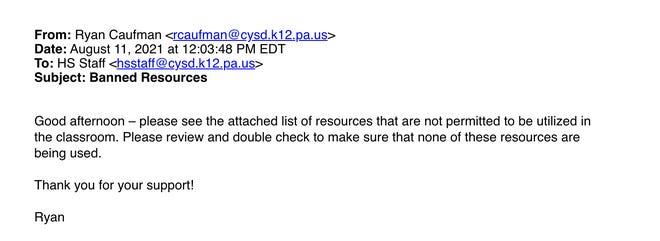In latest Central York book controversy, author calls ban a ‘violent act’
When Sapphire wrote Push—the novel that eventually spawned the Oscar-winning film Precious—25 years ago, she wrote it specifically for teenagers.
Prior to her writing career, novelist-born Ramona Lofton often counseled teenagers on everything from pregnancy to drug use. These experiences, in addition to her own life, shaped the novel recently pulled from the library shelves of the Central York School District.
“If they could live it, they could certainly see it being written and read about,” Sapphire told The York Dispatch, adding that teenagers today still face the same problems — and more.

Sapphire said she didn’t expect her book to be banned, but a number of school districts have pulled “Push” off their shelves — and not just in York County. Similar bans have surfaced in Florida and Michigan in recent months.
It’s all part of a larger nationwide push that includes banning books, films and other educational materials in Central York in 2021 that specifically target color professionals. The Central York School Board eventually reversed the earlier ban amid global publicity and outcry. “Push” was not included in this earlier list.
PEN America, a nonprofit organization that supports free expression through literature, recorded 2,532 unique cases of books being banned in American schools between July 2021 and March 2022.
MORE:Inventory is at an all-time low for York County’s housing market
MORE:Police are looking for a vehicle that hit an 11-year-old girl
MORE:York County initiates bidding process for Central Booking project
In Central York, Superintendent Peter Aiken sent a letter to parents on Tuesday explaining that a parent had disputed a book in the high school’s library. Under current policy, the district assembled a team of two administrators and three teachers to discuss the book.
The team decided the novel was inappropriate, the superintendent explained, so the book was removed.
Aiken wrote that, as a former English teacher, he values literary expression.
“That said, I also believe books in schools should be age and developmentally appropriate,” he wrote, adding that the district will identify books that would not receive a “PG” rating. Aiken also said parents can restrict their children’s access to certain books, similar to other districts.
At a meeting earlier this week, school board members did not comment on the recent removal of material from the library. Board Vice President Jodie Grothe described the situation in a subsequent phone call as a “fictitious ban”, but did not want to comment further on the situation with “Push”.
School officials have often denied that the 2021 ban was a ban – despite emails to teachers describing it using that word. At the time, then-board member Veronica Gemma claimed, “We have never been a district that bans books, and we do not support book bans.”

Earlier this year, in an interview with The York Dispatch, Aiken described a book that was included in the 2021 list by saying, “I’ll put it in air quotes – banned.”
Sapphire said she thought teachers and their peers would accept her book. For her, “Push” speaks to real-life issues of teenage pregnancy and how people can pull themselves up on their bootstraps even if they don’t have them.
The novel’s removal speaks to larger cultural undercurrents, the author added.

“We are in a shift for the life of democracy in this country,” she said.
>>Please consider subscribing to support local journalism.
Without books like Push, Sapphire said, the realities teenagers face would be obliterated. The silence condones the notion that women who become pregnant as a result of rape—as the book’s protagonist, Precious, does—are sinners.
“(If) you don’t read anything like ‘Push,’ you could buy that,” she said, adding that some people might then believe someone like Precious should face death if they’re asking for an abortion after being raped would.
USA Today reported that South Carolina’s Republican legislature is considering a bill that could potentially make those who obtain abortions face the death penalty. This law provides no exceptions such as rape or incest.

Sapphire said she read many texts with disturbing themes as a young woman, including Anne Frank’s The Diary of a Young Girl and George Jackson’s Soledad Brother: The Prison Letters. Those books helped teach her empathy, she said.
Removing material from school libraries effectively shuts off young minds from the world, she said, likening it to jailing the child without access to a lawyer.
“It’s a much, much more violent act,” Sapphire said, explaining that once a banned book is gone, kids don’t know anything about it. “It just won’t exist.”

MOREYork City is asking residents to discuss the comprehensive plan at upcoming forums
MORE:The man acted erratically before stabbing the woman, the witness says
MORE:As part of TMI’s decommissioning, concerns about water use and discharge arise
She said her book did its job: it doesn’t teach people to be violent, but rather helps people see other parts of a world that isn’t clean. She still gets letters from kids who are growing up and want to be the teacher in the book, she said. A while back, two white men in a department store reached out to Sapphire to say that “Push” has changed the way they view their positions as social workers, she said.
“Precious is a good girl,” said the author. “She wants to have a good life. She wants to be a good mother. She wants to learn to read.”
For those who wish to read the book, physical and audiobook editions are available through the York County Libraries system. Sapphire also noted that students can join New York City Public Libraries, receive an online flashcard, and borrow any book they want to read.
— Reach Meredith Willse at [email protected] or on Twitter at @MeredithWillse.
